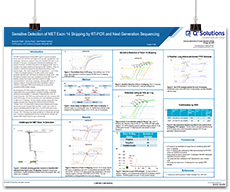
Sensitive Detection of MET Exon 14 Skipping by RT-PCR and Next Generation Sequencing
RT-PCR assay that detects MET exon 14 skipping independent of the causal mutation
The MET receptor tyrosine kinase (MET) gene is a proto-oncogene whose abnormal activation can trigger tumor growth, angiogenesis, and metastasis. Numerous mutations have been identified that lead to over-activation of the gene, including well characterized amplification and somatic mutations. Mutations that lead to the skipping of MET exon 14 are likely to be highly predictive of response to MET inhibition.
Exon 14 contains a motif that is required for the efficient recruitment of the ubiquitin ligase, CBL, which targets MET for degradation. Loss of exon 14 leads to prolonged stability of the MET protein which causes increased signaling upon stimulation by hepatocyte growth factor. Over 200 distinct mutations have been identified that cause MET exon 14 skipping ranging from single nucleotide mutations to large insertion/deletions. Due to this complexity, detecting MET exon 14 skipping mutations using DNA-based NGS hybridization capture methods is challenging. RNA-based testing can circumvent the complexity of DNA-based changes.
In this poster, presented at AACR 2018, you will learn about our RT-PCR assay that detects MET exon 14 skipping independent of the causal mutation.
Authors: Mukund Patel, Honey Polur, and Patrick Hurban
Complete the form below to access this scientific poster








